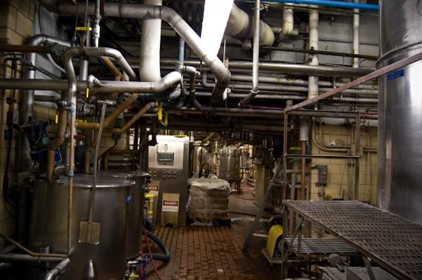분류 [Engineering/Technology] Incheon National University Researchers Push the Limits of Gas Sensing Technology
- NO
- 375919
- Date
- 2023-10-30
- Modify Date
- 2024-02-22
- Writer
- 연구기획관리과 (032-835-9322~5)
- Count
- 1706
Incheon National University Researchers Push the Limits of Gas Sensing Technology
They propose an innovative approach for creating organic–inorganic hybrid gas sensors which achieve impressive durability, selectivity, and sensitivity
Harmful gases, such as nitrogen dioxide, are commonplace in industrial settings. However, existing gas sensors are expensive and complex, which has limited their widespread adoption. In a recent study, researchers from Korea developed an organic–inorganic hybrid semiconductor gas sensor, which demonstrated remarkable performance and durability. This relatively low-cost technology could pave the way to convenient gas sensing devices for applications such as industrial monitoring, air quality analysis, food safety, and even medical diagnosis.

Image title: Progress in gas sensing technology will help keep industrial workplaces safe
Image caption: In an industrial setting, the concentration of harmful gases should be constantly monitored to prevent health issues among workers. Thanks to recent advances in organic semiconductor-based gas sensors, gas sensing devices could become cheaper, smaller, powerful, and durable.
Image credit: Brian Boucheron from Flickr https://www.flickr.com/photos/88138723@N00/1207094703
License type: CC BY 2.0
The world has become increasingly industrialized over the past few centuries, bringing all sorts of technology and conveniences to the masses. However, workers in industrial environments are often at the risk of exposure to many dangerous gases, such as nitrogen dioxide (NO2). Inhaling this gas can lead to serious respiratory diseases like asthma and bronchitis, and severely compromise the health of industrial workers. Constant monitoring of NO2 levels is thus needed to ensure a safe workplace.
To help with this, many types of selective gas sensors have been developed using different organic and inorganic materials. Some of them, such as gas chromatography sensors or electrochemical gas sensors, are highly sophisticated, yet expensive and bulky. On the other hand, resistive and capacitive sensors based on semiconductors seem to be a promising alternative, with organic semiconductor (OSC) gas sensors representing a low-cost and flexible option. Nonetheless, these gas sensors still face some performance issues, including low sensitivity and poor stability for sensor applications.
Against this backdrop, a team of researchers from Korea, led by Professor Yeong Don Park from the Department of Energy and Chemical Engineering at Incheon National University, set out to find innovative strategies to take OSC NO2 sensor technology to the next level. Their study was made available online on August 15, 2023, and published in Volume 473 of the Chemical Engineering Journal on October 1, 2023. It was carried out in collaboration with researchers from Jeonbuk National University, including Professor Min Kim.
To this end, the team proposed a hybrid organic–inorganic gas sensor design based on the combination of a conductive organic polymer and perovskite nanocrystals. They incorporated a CsPbBr3 perovskite into a conductive polymer matrix to enhance its gas sensing performance while maintaining sensing speed. They further modified the surface of the perovskite nanocrystals with zwitterionic polymer ligands. Once hydrated, these ligands greatly improved the affinity of the sensor for NO2 gas molecules, thus resulting in improved absorption.
Further experiments revealed that the proposed design outperformed conventional sensors in terms of chemical sensitivity to NO2. Moreover, their system was highly resistant to oxidation, thanks to the protective action of the perovskite nanocrystals. Thus, it could withstand storage in ambient conditions for several weeks, showcasing impressive durability and higher potential for long-term installation. “Our findings suggest a new approach for the development and design of gas sensors based on various material composites to achieve both superior sensitivity and selectivity,” highlights Prof. Park, while discussing the results.
Given that OSCs can be designed to be flexible, lightweight, and relatively inexpensive when mass produced, they could pave the way to the widespread adoption of gas sensors in various contexts. “Beyond specific settings like industrial sites, OSC gas sensors could enable individuals to readily access information about air pollution levels through commonplace devices like smartwatches,” explains Prof. Park. He further adds, “Moreover, these sensors have the potential to advance diagnostic technology by facilitating the early detection of medical conditions. Therefore, it has potential not only for industrial safety but also in the realms of food safety, chemical substance monitoring, and medical diagnosis.”
Here’s hoping that gas sensing technologies continue to evolve so that harmful compounds never go unnoticed!
Reference
|
Authors: |
Duho Jang1, Haedam Jin2, Min Kim3,*, and Yeong Don Park1,* |
|
Title of original paper: |
Polymeric interfacial engineering approach to perovskite-functionalized organic transistor-type gas sensors |
|
Journal: |
Chemical Engineering Journal |
|
DOI: |
10.1016/j.cej.2023.145482 |
|
Affiliations: |
1Department of Energy and Chemical Engineering, Incheon National University 2Graduate School of Integrated Energy-AI, Jeonbuk National University 3School of Chemical Engineering, Clean Energy Research Center, Jeonbuk National University |
*Corresponding authors’ emails: minkim@jbnu.ac.kr (M. Kim); ydpark@inu.ac.kr (Y. Don Park)
About Incheon National University
Incheon National University (INU) is a comprehensive, student-focused university. It was founded in 1979 and given university status in 1988. One of the largest universities in South Korea, it houses nearly 14,000 students and 500 faculty members. In 2010, INU merged with Incheon City College to expand capacity and open more curricula. With its commitment to academic excellence and an unrelenting devotion to innovative research, INU offers its students real-world internship experiences. INU not only focuses on studying and learning but also strives to provide a supportive environment for students to follow their passion, grow, and, as their slogan says, be INspired.
Website: https://www.inu.ac.kr/sites/inuengl/index.do?epTicket=INV
About the authors
Professor Yeong Don Park’s research focuses on the fabrication and characterization of conductive polymer-based devices, whereas Professor Min Kim conducts research mainly on the gas adsorption properties of perovskites. By merging these two distinct research fields, one involving organic materials and the other inorganic ones, the authors were able to achieve excellent results by benefiting from the synergistic effects between them.